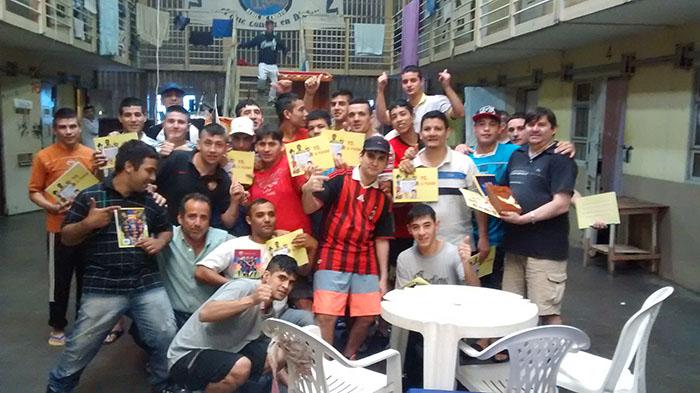The Cuban literacy method Yo, sí puedo (Yes, I can) is seeing positive results in Argentina, where it is being implemented in prisons
The initiative is supported by the Multi-sectoral Solidarity with Cuba Organization in the city of Rosario, Santa Fe province.
Speaking to Granma International on a visit to Havana, the Director of the organization, agriculture sector worker Guillermo Cabruja, stated that he felt optimistic given the results obtained by facilitators who have imparted 65 classes, aided by text books and audiovisual materials, and taught young inmates to read and write.
”Today we have been working for over three years,” stated the Argentine activist, “We have taught over 50 inmates between the ages of 18 and 35 to read and write. Meanwhile another one hundred or so are currently enrolled in the program in other prisons. We even receive support from pedagogical school students from the region, as well as artists and intellectuals.”
Guillermo Cabruna noted that the idea to teach prisoners to read and write emerged from a previous experience which saw thousands of people graduate from the Yes, I can program implemented in different communities across Argentina.
In late 2013, organizers proposed to extend the initiative to poorer and more vulnerable communities, and in particular marginalized youths lacking in opportunities as a result of neoliberal policies.
In order to do so, the project sought support from the Evangelical church, which works closely with prisons, and facilitated communication between organizers and institution authorities, which led to the creation of a strong link with the church and the opportunity to provide the program to young offenders.
The first 18 inmates graduated in July 2014, an event which received positive press coverage and praise from church officials. Every student was allowed to invite two family members to share this special occasion in their lives. The achievement also served to demonstrate the legitimacy of the Cuban method which had previously been banned by municipal education authorities, citing banal and ambiguous excuses.
With participants frequently requesting dictionaries to look up certain words, the idea of giving each a book donated by the population emerged. Given such a large number of donations, a mobile library was created, offering a vast array of literary works and named after Federico Pagura, the Bishop who worked to establish the program in the prison, and a good friend of Cuba.
Guillermo Cabruna has published a lot of information related to literacy efforts in prisons on social media and organized a meeting to attract more collaborators. He had hoped to bring together at least ten people, but over 80 of varying professions showed up, out of which emerged the idea of continuing educational efforts through vocational training workshops on literature, painting, music, yoga, self-esteem, family and gender violence, among others.
The pieces written by inmates as part of the literature workshop were complied into a book: Entre mandarinas y tumbas, una antología de poesía y relatos, a signed copy of which was sent to the leader of the Cuban Revolution, Fidel Castro, as a gesture of gratitude. Four of the authors featured in the book learned to read and write through the Yes, I can program, one of which wrote: “My name is Iván Ezequiel Galarza. Not many people know me. Always failing, today I won.”
The most important lesson of the process, according to Guillermo Cabruna, is that “these adolescents felt unloved by everyone. They didn’t choose to leave school at six or seven years old. They suffered from a lack of love, violence and were abandoned by society. Our number one aim is to help them to achieve their goal of becoming better people.”
The Cuban literary method was created in 2001 by renowned educator, the late Leonela Relys, at the Latin American and Caribbean Pedagogical Institute and was recognized in 2006 by UNESCO.
Angel Raimundo Alvárez Alonso, Cuban program collaborator in Argentina, was responsible for providing course materials and training facilitators who would later teach inmates.
Alvárez Alonso, Educational Sciences MSc stated that “The Yes, I can method has been implemented in 17 provinces and 76 municipalities in Argentina and at a national level has taught over 30,000 people to read and write. The 65 classes are recorded on a 17 disc DVD series and adapted to the characteristics of where the program is being taught, such as idiomatic phrases particular to the specific area.”
A teary-eyed Alvárez Alonso noted that he felt a great nostalgia for the work started, and later continued, by project advisor Mario Salas Coteron, summed up with the phrase: “I learned a lot with the Argentines.”
 Escambray ENGLISH EDITION
Escambray ENGLISH EDITION






Escambray reserves the right to publish comments.